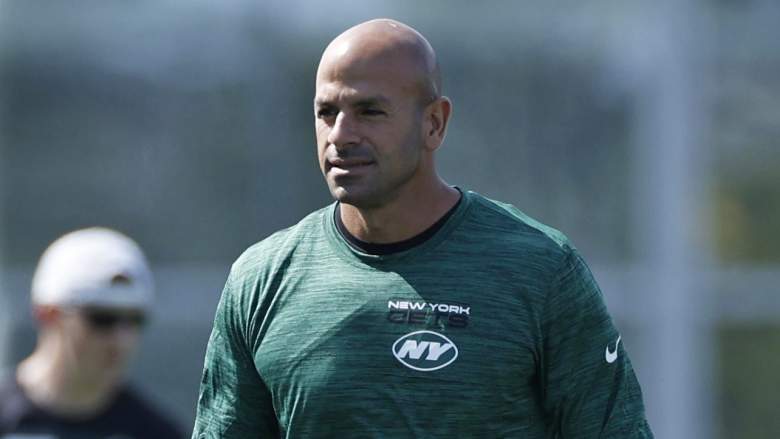
At the start of this offseason, 2021 signings Carl Lawson and Corey Davis were reported as two of the New York Jets’ most likely cut candidates in 2023 because of the way their contracts were structured.
Head coach Robert Saleh already surprised media and fans over the weekend when he hinted that Davis would still be a part of the offense this season during a conversation with NFL Network reporter Judy Battista. On March 27, he backed Lawson in a similar way while chatting with reporters at the NFL League Meeting, except this vote of confidence was a near-guarantee from the Jets HC.
“I’ll speak for Joe [Douglas] on this one,” Saleh began after being asked if Lawson would be on the team in 2023. “You know pass rushers, they don’t grow on trees, and Carl has a commodity in this league that’s [as good as] gold. He will be here as long as he can — as long as he can walk and play and rush the passer, and affect it the way he does, he’ll be here.”
Davis and even Aaron Rodgers himself didn’t get this sort of Saleh stamp of approval. It appears that the Jets will once again enter training camp with a pass rusher room headlined by Lawson, John Franklin-Myers, Jermaine Johnson II, Micheal Clemons and Bryce Huff (tender pending).
How Would Carl Lawson’s Return Impact Snap Count?
Three of the reasons fans were intrigued by the idea of a Lawson cut were Johnson, Clemons and Huff. Each played a very limited role in 2022, and that sort of young talent felt ready for more responsibility in year two (or year three for Huff).
According to Pro Football Focus, Johnson and Clemons had almost identical snap counts as rookies — although the first-round pick did miss a few games due to injury. Johnson finished with 312 defensive snaps, including a well-rounded 158 on run defense, 151 as a pass rusher, and three in coverage.
Out of the trio, Clemons was the defender used most heavily against the run, with 164 on run defense and 145 as a pass rusher (two in coverage, 311 total).
Then there’s Huff, the pass-rush specialist. In 2022, 173 out of Huff’s 191 total defensive snaps came rushing the quarterback, which equates to 90.5%. Clearly, the Jets do not see him as an all-around defender at this stage of his development.
Now, if Lawson had been released, Johnson would have been the most likely candidate to take over first team duties in a timeshare with some combination of Clemons and Huff. With that theory looking unlikely, how will the veteran be utilized during his second healthy campaign under Saleh?
There are three plausible theories on this. One; Lawson is used the same amount as in 2022, retaking the starting role across from “JFM.” Per PFF, the big-name edge rusher outsnapped all Jets D-ends a year ago, with 663 compared to Franklin-Myers’ 643.
Theory two; Lawson is scaled back a bit due to the emerging youngsters on the roster. It is fair to note that he was used as a pass rusher 65.2% of the time — which was a much higher rate than plus run defenders JFM (58.9%), Johnson (48.4%) and Clemons (46.6%). Perhaps you’ll see Lawson relinquish even more early down duties to Johnson and Clemons in 2023.
Theory three; Lawson gets more snaps now that he’s fully healthy coming off a torn Achilles during the summer of 2021. This seems the most implausible, considering Saleh’s rotational philosophy and the fact that there’s a logjam of talent behind him.
Will Jets Urge Carl Lawson to Restructure?
Since it appears that Lawson is staying put, the only other question remaining is his cap hit.
Over the Cap broke down Lawson’s current deal as a $15.733 hit, which includes a $15 million base salary. The remaining portion of this hit comes in bonuses — a non-negotiable $333K prorated bonus and another $400K in “other bonuses.”
We’ve seen general manager Joe Douglas rework several veteran deals this offseason, and Lawson could be the next in line to convert some of his base salary and save some cash. SNY’s Connor Hughes detailed how this is possible with a player in the final year of his contract on March 11.
“You still can [restructure] with a player on the final year of deal,” Hughes explained. “You convert base to signing bonus, then add ‘void’ years to the contract — prorating [the] hit there. The [Philadelphia] Eagles do this a lot.”
Douglas has been adopting a few of his former mentor Howie Roseman’s tricks this spring, but there is one more option. If both parties agree, they could lower his cap hit by signing him to an extension.
Comments
Jets’ Robert Saleh Ensures Cut Candidate’s Safety: ‘He’ll Be Here’